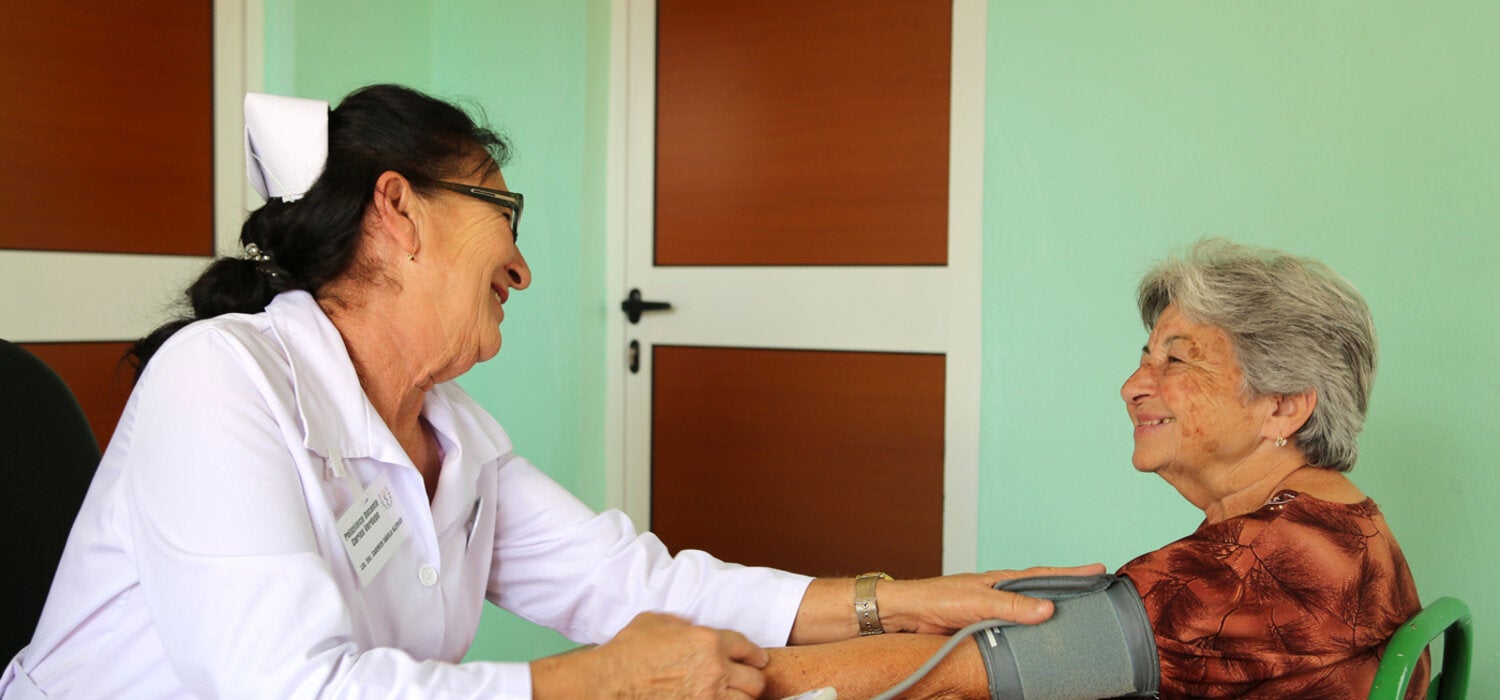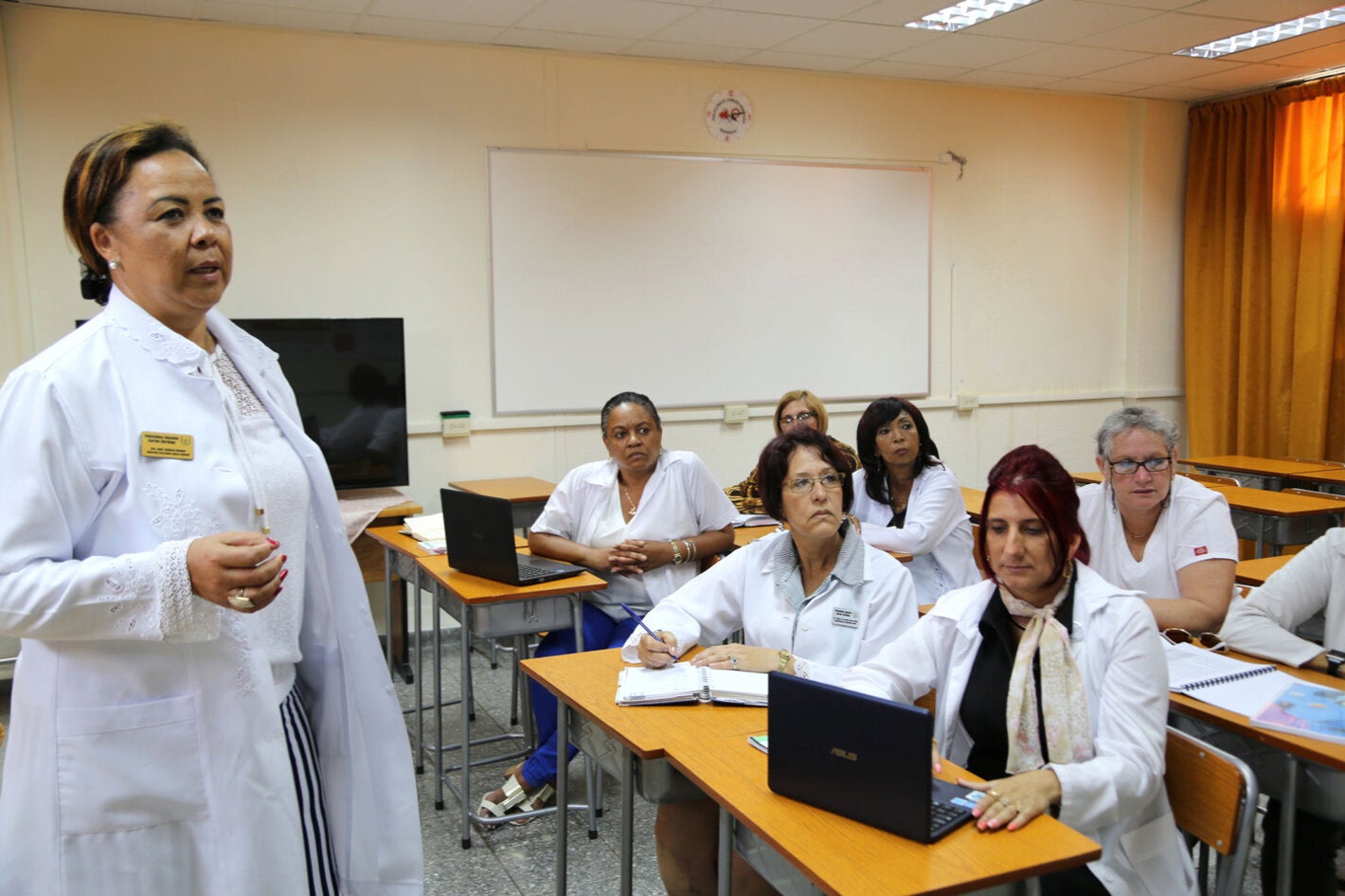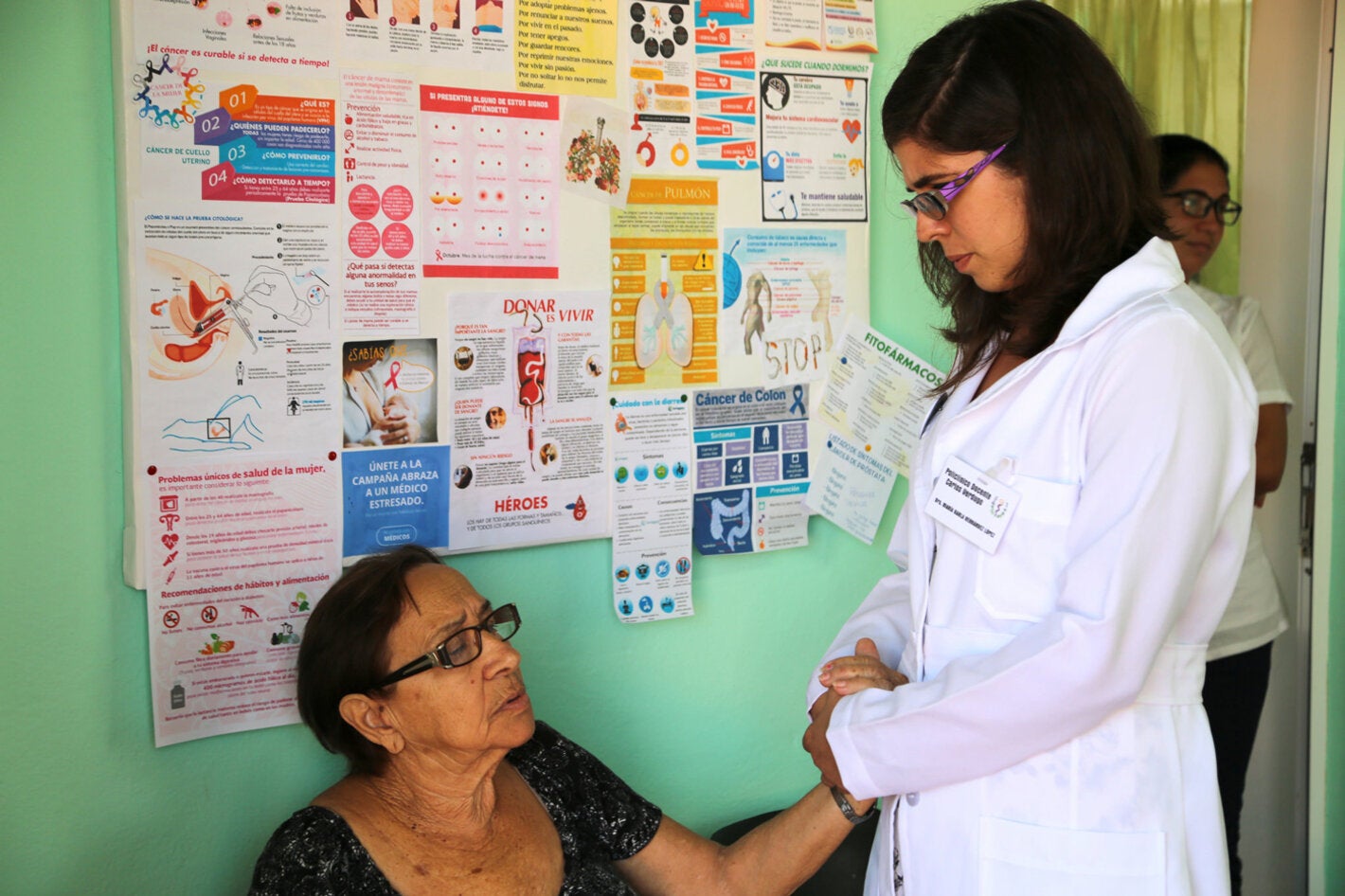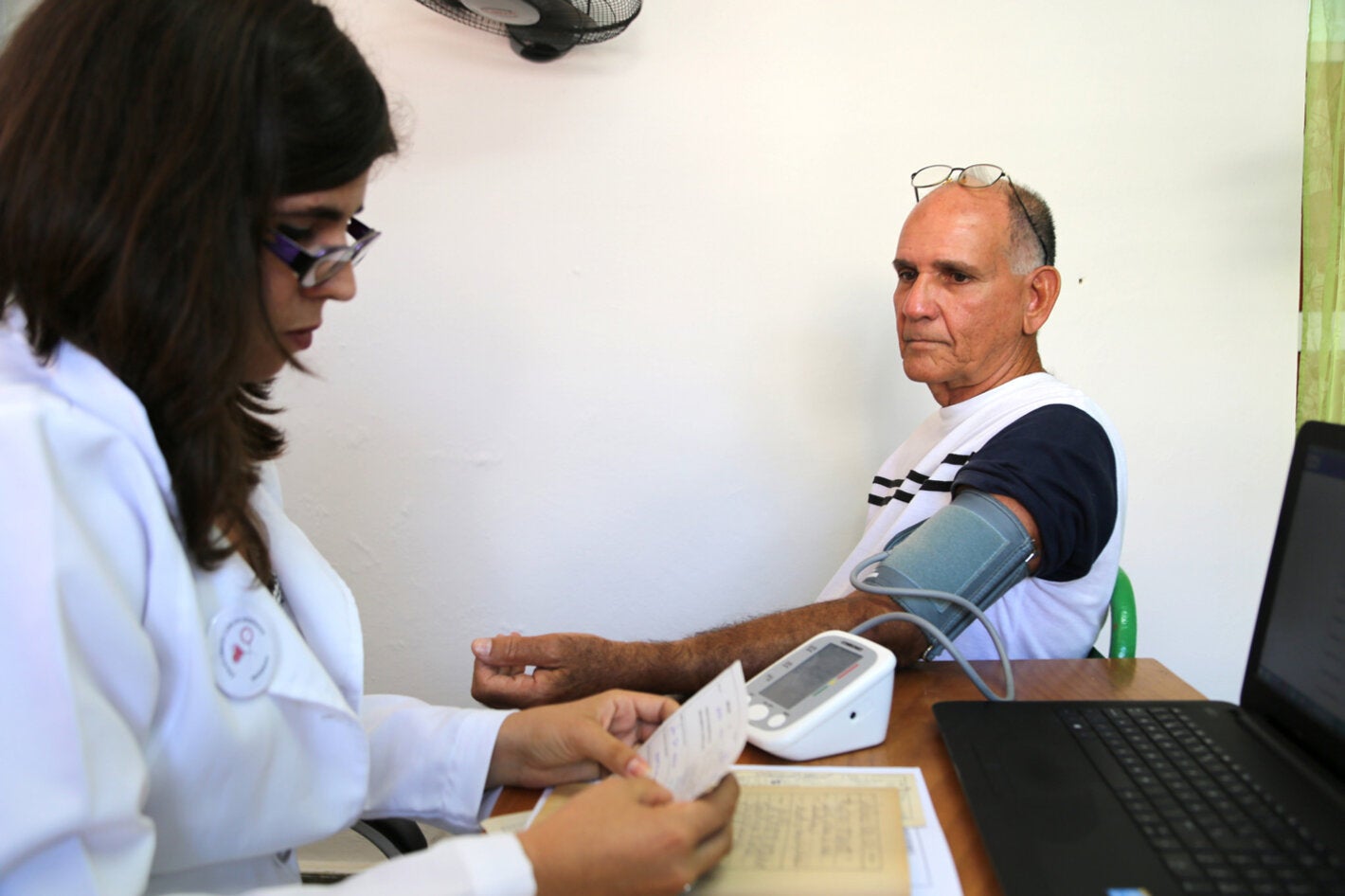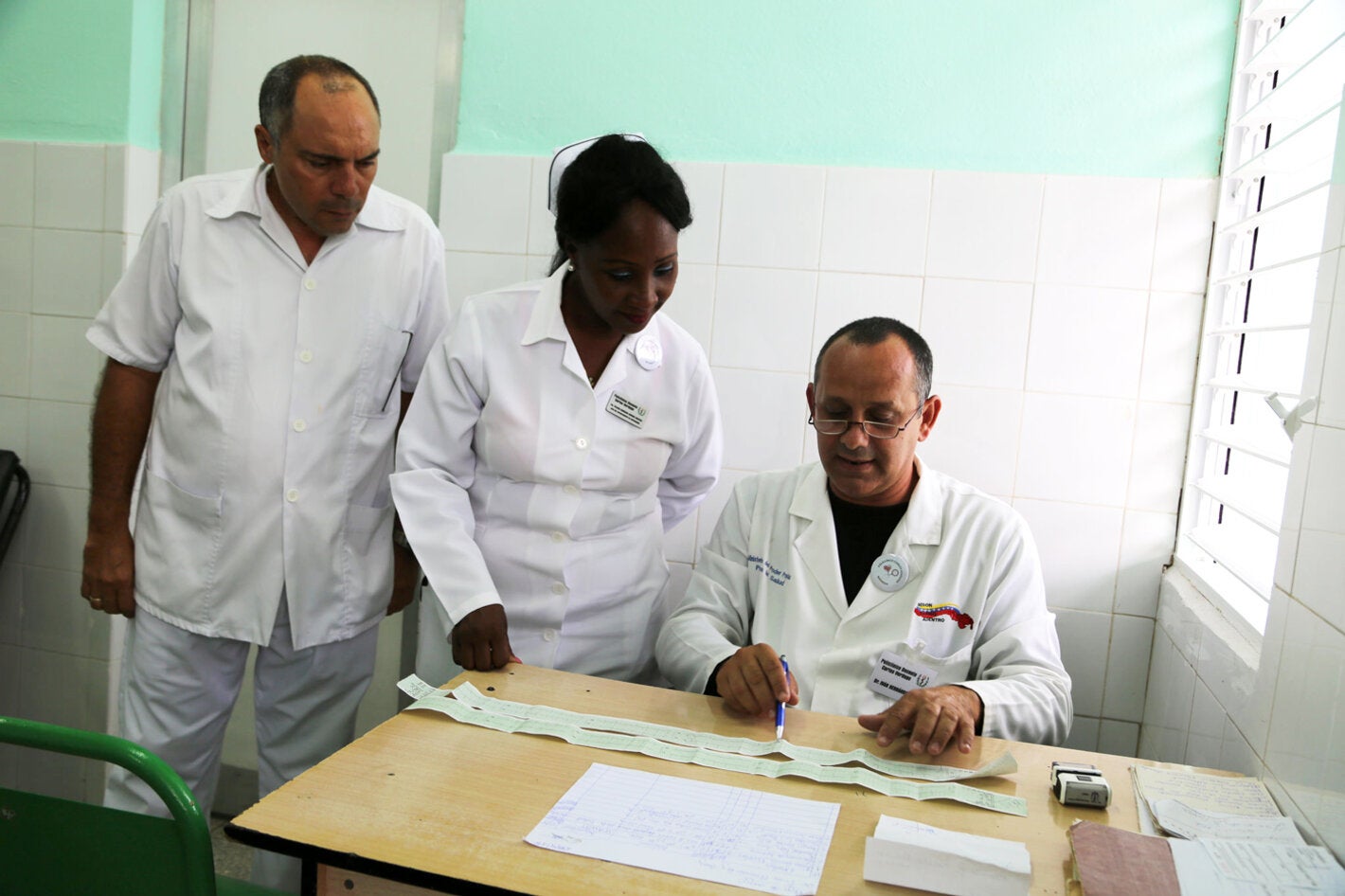Hypertension initiative implemented in Cuba leads to better outcomes for patients with high blood pressure
Matanzas, Cuba, May 17, 2018 (PAHO) - Marta is 69 years old and has suffered with high blood pressure for the past 16 years. She takes medication to keep it under control and prevent complications, but despite her efforts to exercise and avoid salt, stress sometimes causes her blood pressure to rise.
"My mom has advanced Alzheimer's, which sometimes causes me a lot of stress," said Marta. "But now, thanks to the medication, I've been feeling better. If I feel my blood pressure start to rise, I come to the clinic for a check-up or I ask my daughter to measure it, and I drink some linden tea to relax," she explained while waiting to be seen by her doctor at Clinic 11 in Pueblo Nuevo, Matanzas, Cuba.
In the Clinic 11 office of Family Doctor, Dr. Carla Hernández and licensed nurse, Carmen Dávila, the health of 329 families, or 1010 local residents, is monitored and looked after. Of these residents, 41% have hypertension, much higher than the 33% national average. Dávila has worked in the office for 30 years and claims to know everyone in the neighborhood. "I see them born, grow up and become old," she said.
"Come in Martica, sit here and I'm going to take your blood pressure before you go to see the doctor," says the nurse, pointing to the green chair next to her. Dávila has been working in that office for 30 years and affirms that he knows all the people in the neighborhood because "I have seen them be born, grow and age."
Stronger Health Teams
The health team at Clinic 11, as well as the teams working at the other 22 clinics that fall within the remit of the Carlos Verdugo Teaching Polyclinic and the three community pharmacies in the area, has benefitted from improvements made by the HEARTS initiative in Cuba.
This initiative, promoted by the Pan American Health Organization / World Health Organization (PAHO / WHO), the United States Centers for Disease Control and Prevention (CDC) and other partners, seeks to prevent and better manage hypertension in order to avoid the complications and premature deaths that arise from cardiovascular disease, including heart attacks and strokes.
It is estimated that in the Americas region, 40% of patients with hypertension are unaware of their condition and only 30% of those who know they are hypertensive and receive treatment have their blood pressure under control. In Matanzas, however, 90% of patients with hypertension in the Carlos Verdugo Polyclinic area know what their blood pressure is, and 68% of those treated have it under control.
The actions carried out within the framework of the project have also contributed to improvements in the hypertensive patient registry, leading to an increase in the number of patients whose blood pressure is under control, which has risen from around 50 to 68 percent.
"Muchos no aceptan que son hipertensos, dejan la dieta, el ejercicio y de tomar la medicación porque se empiezan a sentir bien, y allí es cuando viene el descontrol"
"I have many patients with hypertension, but 60% are under control," said Dr. Hernández. "My objective is to reduce irregularities in order to prevent damage to the heart."
According to Dr. Hernandez, patients whose blood pressure is not well managed tend to be young men of working age. "Many do not accept that they have hypertension and stop their diets, cease to exercise and refuse to take medication because they feel fine. This is precisely when irregularities start to appear," she warned.
"In order to generate lasting behavioral changes in patients, we run educational talks, with demonstrations on healthy eating and how to eat a low sodium diet," said Hernandez. "The primary goal in family practice is disease prevention and health promotion."
Hypertension in the Community
Three times a week, Dávila visits patients in the community to look for those with hypertension. "We take this proactive measure because we know that there are patients over the age of 18 who do not know they are hypertensive," she said.
On Thursdays, the office also opens later, until 8 pm, in order to "accommodate patients who work and cannot visit during the day.
Other actions taken in Matanzas in order to diagnose hypertension include "Healthy Saturdays", an activity that engaged the community, health personnel and social organizations in proactively identifying cases of hypertension in rural areas around the polyclinic.
As the polyclinic is also a teaching facility, medical students have been involved in the project from day one, participating in field trips and monitoring blood pressure levels.
An algorithm to improve control
On her desk at Clinic 11, Hernandez keeps a blood pressure monitor and a laminated sheet of paper. Written on the paper is an algorithm developed by health authorities and health personnel alongside supported by PAHO / WHO and the World Hypertension League. The algorithm was designed to facilitate the diagnosis and treatment of hypertension. "It's very useful and makes my job a lot easier," affirmed the doctor.
The algorithm includes tables with guidelines on diagnosis and treatment according to blood pressure level, cardiovascular risk and patient characteristics. In 2017, the algorithm was included in the National Guideline on Blood Pressure Control, and it is already being utilized throughout the country.
In addition, a digitalized clinical record system was also created to monitor patients and make informed decisions. The system coordinates with pharmacies to monitor the delivery of medications each month. "This way, we are able to make sure that every patient receives the medication they need," said Hernandez.
Less hypertensive emergencies
In the emergency room of the Carlos Verdugo Polyclinic, all three beds are occupied. In one of them, an elderly woman receives medication to reduce her blood pressure, which had been triggered by a family crisis.
"Prior to the project, we had four to five cases of uncontrolled hypertension each day. Now, they rarely exceed two," said Iván Hernández Cruz, Emergency Physician at the polyclinic.
According to Hernández Cruz more than 60% of cases are resolved at the polyclinic. Patients are then referred to the family doctor for follow-up. He added that most cases are resolved by the family doctor before they become emergencies.
With her notebook and statistics in hand, Director of the Carlos Verdugo Polyclinic, Aicel Reinoso Mackay, highlights another encouraging result: Heart attacks are no longer the main cause of emergency room visits.
From Matanzas to Cienfuegos and Villa Clara
Yamilé Valdéz González, the Project's National Technical Coordinator from Cuba's National Hypertension Commission revealed that "the experience of Matanzas shows that hypertension can be managed within a short time-frame and improvements can be made to treat complications and improve quality of life." As a result, the country took the initiative to a national level and is currently extending it to the provinces of Cienfuegos and Villa Clara.
"The HEARTS project is an opportunity to implement a series of simple measures that work, prevent complications from cardiovascular diseases and save lives," said Pedro Orduñez, PAHO/WHO Regional Advisor on the Prevention and Control of Chronic Diseases.
The measures included in the HEARTS package include counseling on healthy lifestyles, the implementation of evidence-based treatment protocols, access to essential medicines and technologies, health-based care, and the implementation of ongoing monitoring systems.
In addition to Cuba, the HEARTS initiative in the Americas is being implemented in Barbados, Chile, and Colombia. Ecuador and Panama have also recently joined the project.

